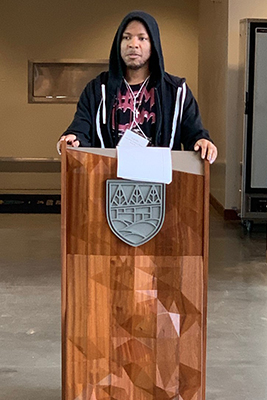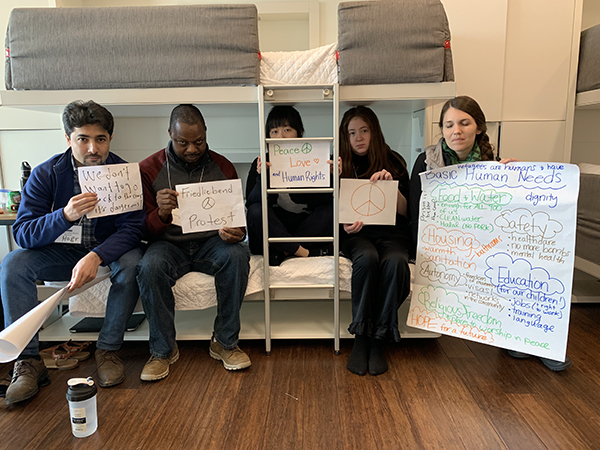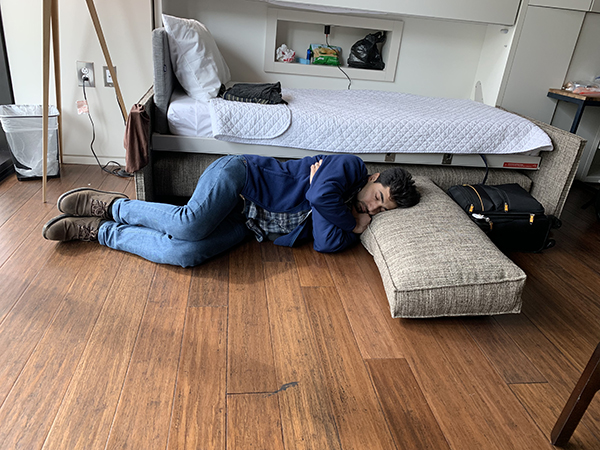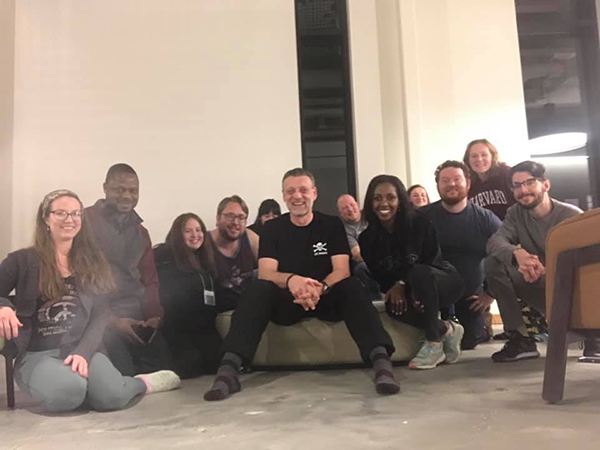No Wall Needed: Learning to Navigate Migration

Graduate Students Participate in Weekend-Long Humanitarian Simulation
KENNESAW, Ga. (Mar 28, 2019) — The refugees are safe! That was the much-celebrated outcome of the three-day long humanitarian crisis simulation SCMPD Professor Volker Franke conducted at Camp Southern Ground in Fayetteville, GA March 15-17. The simulation involved 20 KSU conflict management Masters and PhD students and also drew a number of external participants.
Playing roles ranging from refugees, political candidates, townspeople and UN representatives, participants simulated the response of a small fictitious East German town to the massive influx of refugees from Syria in 2015/16. In the fast-paced exercise, the players had to respond to food and health crises, protests and violence, educational needs and religious demands in an environment characterized by scarce resources.
“The purpose of simulation exercises,” Franke explains, “is to connect participants not only intellectually and cognitively with an issue but also emotionally. The lasting learning effect of ‘feeling’ dilemmas is far greater than merely reading about them.” The refugee exercise was designed specifically to develop empathy for the complexity of international migration and the plight of those fleeing persecution, violence and other existential threats. “While we cannot and would never want to subject anyone to the fear and suffering refugees experience, simulating some of the dynamics that shape this crisis provides an opportunity for participants to learn about and personally relate to the multicultural and intercultural forces affecting a large-scale humanitarian crisis,” Franke clarifies.

Exhausted after three days of play, participants seemed satisfied with their experience. Cody Wehlan, an INCM PhD student noted, “This is the first time I participated in a simulation like this. I found interesting to see how some of the theories we learned in class were applied as part of the play.” Wehlan, who played the refugee camp administrator, explains further, “as
much as I wanted to build relationships with the refugees, I had to balance that desire with my professional role responsibilities and the many demands coming from the other role players.” Wehlan’s biggest take-away was “no matter how hard you fight, sometimes the dragon still wins, meaning sometimes you can do everything right and still fail. It was a very realistic experience.”

Raissa Irakoze who is originally from Rwanda played the UNHCR representative said “this was a really good learning experience, very close to reality. The refugees were really treated like refugees in real life which was an eye-opening experience to many of us. We did not know who to trust and had to respond fast to news and decisions made by other players.”
“This simulation was a powerful experience and an incredible exercise in empathy and perspective,” said Allison Sullivan, a MSCM student who played an Afghan refugee. “I came to better understand the feelings of isolation, frustration, and hopelessness that accompany life in a refugee camp. As refugees, we were stripped of our identities and no longer thought of as individuals with personal stories, unique skills, and goals and dreams of our own. Rather, we became a nameless, faceless, collective problem that needed to be ‘solved’ so that everyone else could get on with their normal lives.”
Sullivan went on, “I was surprised by how quickly I felt forgotten and abandoned. Restricted to a faraway tent with limited access to information, we were ‘out of sight, out of mind’ and kept ‘in the dark’ both literally and figuratively. All we could do was wait. And wait. The waiting was the worst. We lost all sense of time. We had no purpose, nothing to do. They say the average length of exile for refugees is two and a half decades? I can’t even imagine. Even just 5 hours in, I was ready to go home.”
At the end of the simulation, participants came together and developed recommendations that could help to better integrate refugees into their receiving communities. Satisfied with the outcome and the learning Franke is now interested in running the simulation also for non-KSU audiences interested in humanitarian and conflict management issues.












